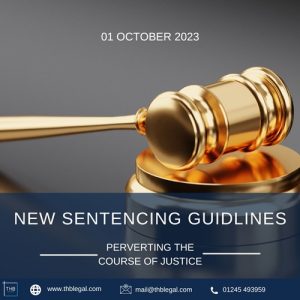Diversity Data for 2025
In accordance with SRA regulations we collect Diversity information, every two years, which is...- 04 July 2025
Posted: 23 August 2023
In a constant effort to maintain the integrity of the Justice System, in August 2023 the Sentencing Council published new guidelines for Perverting the Course of Justice. These will come into effect on 1st October 2023 in England and Wales and apply to offenders aged 18 years and older. The new guidelines aim to provide more robust guidance in relation to offences which may have been overlooked or previous decisions lacked certainty.

The guidelines categorise offences relating to perverting the course of justice into 3 levels of culpability and harm. Minor offences will likely attract a community order. The most serious offences in the top category are those with a higher culpability and a high level of harm caused. These have a starting point of 4 years and a range of 2-7 years in custody.
Examples of these lower-level offences include giving false details about the driver of a vehicle if they have committed a speeding offence, or taking the blame for one of your children if they have been caught speeding. Many may be guilty of these but fail to realise the potential consequences. Although seemingly not too grave, these offences are still considered to be serious and can be found to be perverting the course of justice.
More serious offences include cases involving intentionally misleading the court, making false allegations of rape and/or domestic abuse. These allegations can lead to someone innocent being wrongfully imprisoned and their lives being heavily impacted so are therefore categorised in the highest levels for harm and culpability. Previously, those found guilty of the more serious offences have received sentences of more than 7 years, where appropriate. The new sentencing guidelines are welcomed in instances where there are multiple counts of perverting the course of justice and universal guidance is needed.
A valid question to ask is why have these new guidelines been published and are they needed? The guidelines provide much needed clarity and a precise sentencing range which legal practitioners can refer to when advising clients faced with these offences. Previously case law was used for assistance and was of benefit when determining whether an immediate custody sentence was needed. However, this was inadequate and made it difficult for practitioners and the Courts to determine the length of any sentence.
Even the more common of these offences such as falsely admitting to a minor road traffic offence or providing false details can now result in you committing a very serious criminal offence, being convicted and receiving a custodial sentence.
If you have any queries or wish to discuss criminal offences in further detail, please contact our Criminal Team call 01376 559690 or 01245 493959, or you can send an email to us.
- 04 July 2025
- 30 June 2025
- 12 June 2025